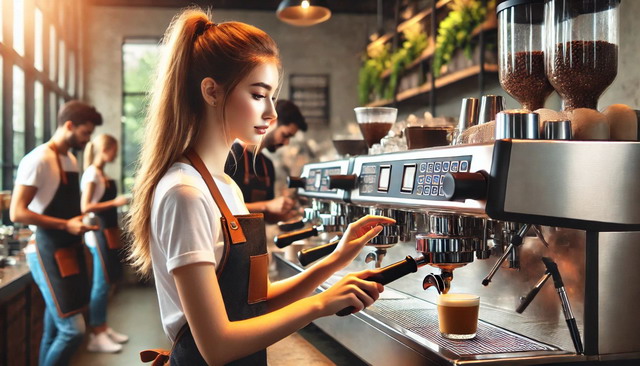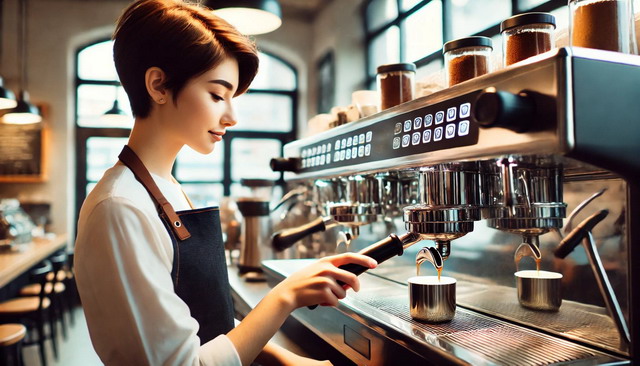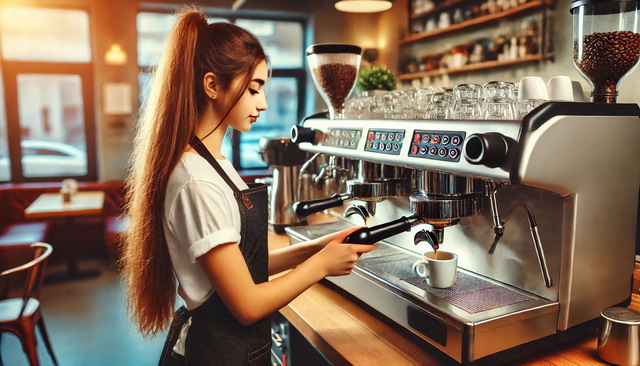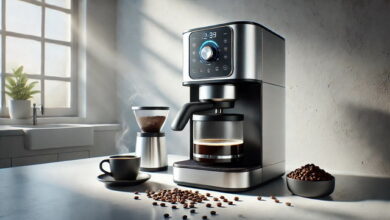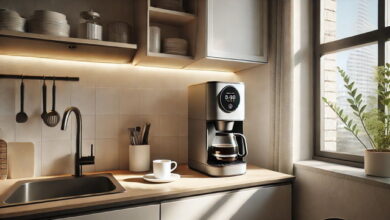Espresso Machine for Commercial Use: Key Features and Top Recommendations
Espresso Machine for Commercial Use
Finding the right espresso machine for commercial use is crucial for any business aiming to serve high-quality coffee consistently. An ideal commercial espresso machine balances performance, efficiency, and features that cater to specific needs, ensuring a seamless brewing experience. With so many options available, selecting the appropriate model can dramatically affect customer satisfaction and operational success.
Businesses should consider factors like installation, maintenance, and reliability when choosing an espresso machine. Understanding these elements helps in making an informed decision that complements both the establishment’s workflow and its brand identity. Investing in a quality machine is not just about the initial cost; it’s about long-term value and functionality.
Additionally, the support and service offered by manufacturers can play a significant role in the longevity of the equipment. Knowing how to operate and maintain the machine ensures optimal performance, allowing the business to flourish. With the right insights, selecting the perfect commercial espresso machine becomes an achievable goal.
Key Takeaways
- Choosing a commercial espresso machine requires consideration of performance and efficiency.
- Proper installation and maintenance are key to sustained operation.
- Manufacturer support significantly impacts machine longevity and reliability.
Understanding Commercial Espresso Machines
Commercial espresso machines are essential for cafes and restaurants that serve high volumes of coffee drinks. Their design and functionalities cater to professional needs, ensuring efficiency and quality.
Types of Commercial Espresso Machines
There are primarily three types of commercial espresso machines: manual, semi-automatic, and fully automatic.
- Manual machines require the barista to skillfully control the brewing process, offering complete control over the espresso extraction.
- Semi-automatic machines combine manual control with automatic features. They allow baristas to manage the brewing time while the machine ensures consistent pressure.
- Fully automatic machines automate the entire process, providing convenience and speed. They are ideal for high-volume settings where quick service is essential.
Choosing the right type depends on the establishment’s needs, skill level of the staff, and customer service style.
Features to Look for in a Commercial Espresso Machine
When selecting a commercial espresso machine, several key features are important.
- Boiler Type: Machines may have single boilers, dual boilers, or heat exchangers. Dual boilers provide temperature stability, while heat exchangers allow for simultaneous brewing and steaming.
- Group Heads: Multiple group heads facilitate preparing several drinks at once. A machine with more group heads is advantageous for busy environments.
- Pressure Control: A machine with consistent pressure ensures better extraction, enhancing the flavor characteristics of the coffee.
- Built-in Grinder: Some models come with a grinder integrated into the machine. This ensures fresh coffee grounds for each shot.
- Ease of Cleaning: Good machines feature removable parts and easy maintenance pathways. Keeping the machine clean improves longevity and coffee quality.
Investing in a reliable machine with essential features can significantly enhance the coffee service experience.
Selecting the Right Machine for Your Business
Finding the right commercial espresso machine is crucial for a thriving business. Key factors to consider include the machine’s capacity, features, and how well it aligns with the business’s target market.
Best Commercial Espresso Machines for Coffee Shops
Coffee shops benefit from machines that combine speed, consistency, and durability. Popular models include the La Marzocco Linea Classic and the Synesso MVP Hydra.
Key Features:
- Dual Boilers: Allows for simultaneous brewing and steaming.
- Customizable Profiles: Tailors extraction to specific coffees.
- Temperature Stability: Ensures optimal brewing conditions.
These machines support high volume output while maintaining quality. Investing in high-end models can enhance service and client satisfaction.
High-end Espresso Machines for Commercial Use
High-end machines like the Faema E61 or Victoria Arduino Black Eagle cater to businesses aiming for excellence.
Attributes:
- Advanced Technology: PID controllers for precise temperature.
- Aesthetic Appeal: Sleek designs enhance ambiance.
- Durability: Built to withstand heavy use.
These espresso machines are designed with features that elevate the coffee-making process, making them ideal for establishments prioritizing quality and presentation.
Affordable Commercial Espresso Machines for Small Cafes
For smaller cafes, it’s essential to balance cost and functionality. Machines like the Rancilio Silvia Pro and Breville BES870XL are excellent options.
Advantages:
- Compact Design: Saves valuable counter space.
- User-friendly: Simple controls for quick training.
- Cost-effective: Affordable for tight budgets.
These machines provide solid performance and quality without overwhelming initial investments, making them suitable for cafes with lower volume.
Commercial Espresso Machines for Specialty Coffee
Specialty coffee shops require machines that bring out the unique flavors of their offerings. Models such as the Elekta Espresso Machine or ** Slayer Espresso** are designed for this purpose.
Traits:
- Pressure Profiling: Adjusts how pressure is applied during brewing.
- Temperature Control: Preserves specific flavor profiles.
- Built-in Scales: Ensures precision for coffee-to-water ratios.
These machines allow for meticulous control over extraction, ensuring that specialty brews are presented at their best, attracting discerning customers.
Installation and Setup
Installing a commercial espresso machine requires attention to detail to ensure optimal performance. Proper setup includes understanding the water line requirements and following a structured installation guide.
Commercial Espresso Machine Setup and Installation Guide
A typical installation guide for a commercial espresso machine includes several key steps. First, select an appropriate location that allows for easy access and sufficient space for operation. The area should have adequate electrical outlets to meet the machine’s power requirements.
Next, carefully unpack the machine and check for any damages. Refer to the manufacturer’s manual for any specific setup instructions. Many machines require assembly of components such as the portafilters and drip trays.
After assembly, level the machine using adjustable feet to prevent vibrations during operation. Finally, perform initial testing to ensure all functions, such as the water and steam, operate correctly.
Commercial Espresso Machine Water Line Requirements
Connecting a commercial espresso machine to a water supply is crucial for optimal functionality. The water line should meet specific requirements, including size, material, and pressure.
Typically, a 1/4 inch or 3/8 inch diameter water line is used, depending on the machine specifications. It is important to use food-grade tubing to prevent contamination.
Water pressure should be between 30 to 50 psi for optimal performance. Installing a water filtration system can improve the quality of water, reducing scale buildup in the machine.
Any connection must adhere to local plumbing codes. It is advised to have a qualified plumber handle the installation. Regular maintenance of the water line will help to ensure the longevity of the espresso machine.
Operation and Maintenance
Proper operation and maintenance are essential for maximizing the efficiency and lifespan of a commercial espresso machine. Regular upkeep includes routine cleaning schedules and prompt troubleshooting to address any issues.
Commercial Espresso Machine Maintenance and Troubleshooting
Regular maintenance significantly reduces the risk of breakdowns. Key tasks include inspecting all components like seals, gaskets, and water lines for wear.
Maintenance Checklist:
- Inspect the water supply.
- Check electrical connections.
- Lubricate moving parts as required.
For troubleshooting, common issues include inconsistent brewing temperatures and pressure problems. If the machine fails to reach the desired pressure, it may indicate a clogged filter or a malfunctioning pump. Immediate attention to these concerns prevents more extensive damage and maintains optimal performance.
Commercial Espresso Machine Cleaning and Descaling Tips
A thorough cleaning routine is crucial for preserving flavor integrity and machine functionality. Daily cleaning should involve wiping down surfaces and cleaning the group head to prevent residue buildup.
Descaling Schedule:
- Monthly for soft water usage.
- Bi-weekly for hard water environments.
Descaling is essential to remove mineral buildup from the boiler and lines. It is recommended to use a manufacturer-recommended descaling solution. Following the instructions carefully helps prevent damage. Regular cleaning not only extends machine life but also ensures a consistent quality of espresso.
Performance and Efficiency
Performance and efficiency are crucial considerations for commercial espresso machines. Factors such as energy consumption, brewing speed, and overall output capabilities greatly impact a café’s operation and profitability.
Energy-Efficient Commercial Espresso Machines
Energy-efficient commercial espresso machines are designed to minimize energy consumption without sacrificing performance. These machines typically feature:
- Insulation technology: This helps maintain temperature with less energy.
- Programmable settings: Reduces energy use during off-peak hours.
- Rapid heat-up times: Ensures machines reach optimal temperatures quickly, reducing idle energy consumption.
Many energy-efficient models meet certifications like Energy Star. This can lead to:
- Cost savings: Lower electricity bills.
- Reduced carbon footprint: A positive environmental impact.
Cafés adopting these machines can enhance their sustainability efforts while maintaining high-quality espresso output.
High-Performance Commercial Espresso Machines for Busy Cafes
High-performance commercial espresso machines excel in fast-paced environments like busy cafés. These units are engineered for durability and speed. Key characteristics include:
- Multiple group heads: Allowing several drinks to be crafted simultaneously.
- Advanced steam wands: Enable quick milk frothing, critical for specialty beverages.
- Pressure profiling capabilities: Providing precise control over extraction, enhancing flavor profiles.
These machines not only keep up with high demand but also ensure consistent quality. Investing in high-performance equipment supports efficiency and customer satisfaction, essential for thriving in competitive markets.
Advanced Features and Accessories
Advanced features and accessories enhance the efficiency and quality of espresso machines in commercial settings. These elements can significantly impact a business’s performance and customer satisfaction.
Commercial Espresso Machines with Built-In Grinders
Many commercial espresso machines now come equipped with built-in grinders. This feature offers convenience by reducing the need for separate equipment. Having an integrated grinder ensures that the coffee is freshly ground immediately before brewing, which can enhance flavor and aroma.
The espresso machine with grinder typically allows for grind size adjustments, catering to different coffee types and extraction methods. This flexibility is crucial in a bustling coffee shop environment. Brands often use burr grinders, known for their consistency and efficiency, making them a popular choice among professionals.
Key advantages of built-in grinders include:
- Space-saving design: Eliminates the need for additional counter space.
- Improved workflow: Faster service with less handling of multiple devices.
- Consistency: Reduces variance in grind size, leading to more uniform shots.
Commercial Espresso Machine Accessories and Upgrades
Accessories and upgrades for commercial espresso machines can enhance functionality and user experience. Many businesses invest in items like milk frothers, water filtration systems, and tampers.
Commercial espresso grinders are essential for establishments producing high volumes of coffee. They provide precision grinding and consistent particle size, crucial for espresso quality. Additionally, upgrading to a more advanced grinder can lead to better taste and efficiency.
Other useful accessories include:
- Portafilter baskets: Variations like single, double, and triple baskets allow for custom brew strength.
- Knock boxes: Facilitate quick disposal of used coffee grounds, improving workflow.
- Aftermarket steam wands: Offer improved frothing capabilities for specialty drinks.
Implementing these accessories can maximize the machine’s capabilities and improve the overall service experience.
Purchasing Options
When acquiring an espresso machine for commercial use, buyers can explore various purchasing options. These include leasing or rental agreements as well as budget-friendly machines perfect for startups. Each pathway offers distinct advantages depending on business needs and financial situations.
Commercial Espresso Machine Leasing and Rental Options
Leasing and rental options provide flexibility for businesses unsure about long-term commitments. With leasing, companies can secure a machine without an upfront purchase, often with maintenance included.
Benefits of Leasing:
- Lower Initial Investment: Businesses can avoid high upfront costs.
- Up-to-Date Equipment: Leasing allows access to the latest technology.
- Tax Advantages: Lease payments may be deductible.
Rental agreements are another viable option. Rentals typically cater to short-term needs, such as seasonal businesses or events. It enables businesses to meet demand without committing to a lengthy lease.
Best Budget Commercial Espresso Machines for Startups
For startups, finding a reliable yet affordable espresso machine is crucial. Several options cater specifically to new businesses looking to minimize expenses.
Top Budget Machines:
- Breville Oracle Touch: Offers an all-in-one solution with advanced features at a moderate price.
- Rancilio Silvia: Known for its durability and quality shots, it’s a good fit for small cafes.
- Gaggia Classic Pro: A high-value entry-level machine with the capabilities needed for a startup.
These models combine quality and affordability, providing an excellent starting point for those entering the commercial coffee market. Careful consideration of features such as ease of use and maintenance can also guide decisions.
Brands and Models
Selecting the right brands and models of espresso machines is crucial for ensuring efficiency and quality in commercial settings. A variety of options exist, each with unique features suited for different needs.
Best Commercial Espresso Machine Brands and Models
When considering commercial espresso machines, several brands stand out for their reliability and performance.
- La Marzocco: Known for its high-quality, dual boiler systems, the Linea Classic is a popular choice among professionals.
- Synesso: The MVP Hydra is praised for its customizable brewing options and consistent temperature control.
- Nuova Simonelli: The Aurelia II is ideal for high-volume cafes, featuring a strong build and user-friendly interface.
Each of these brands offers models that cater to various types of establishments, from small coffee shops to large cafes.
Best Italian Commercial Espresso Machines
Italian brands dominate the espresso machine market, known for their craftsmanship and innovation.
- Rancilio: The Rancilio Classe 9 provides excellent features, including programmable brewing and energy efficiency.
- Gaggia: The Gaggia Accademia combines versatility with high-quality materials, suitable for smaller venues.
- Victoria Arduino: The Black Eagle is designed for precision and control, often seen in specialty coffee shops.
These machines are crafted to deliver authentic espresso while maintaining durability and ease of use in busy environments.
Legal and Safety Considerations
Attention to legal and safety issues is crucial when operating a commercial espresso machine. Compliance with local regulations and understanding warranty implications ensures both legality and protection against potential liabilities.
Commercial Espresso Machine Safety and Usage Guidelines
Safety is paramount when using commercial espresso machines. Operators should receive thorough training on the machine’s functions and potential hazards.
Key safety tips include:
- Electrical Safety: Ensure machines are grounded and use appropriate voltage. Regularly inspect power cords for damage.
- Heat Awareness: Machines can reach high temperatures. Operators should use protective gear, such as gloves, when handling hot components.
- Cleaning Procedures: Following cleaning protocols reduces the risk of contamination and equipment malfunction. Operators must know safe cleaning agents and techniques.
Local laws may require additional certifications or health inspections for food safety. Operators should stay informed about industry standards.
Commercial Espresso Machine Warranty and Support
Understanding warranty and support services is essential. Each machine will come with a manufacturer’s warranty, typically covering defects and malfunctions. The length and terms can vary.
Important warranty details include:
- Coverage Period: Most warranties range from one to three years. Extended warranties may be available.
- What’s Included: Parts, labor, and certain repairs are often covered, but additional damages might not be.
- Customer Support: Reliable customer service is critical for addressing operational issues, often provided through hotlines or local service technicians.
Operators should keep warranty information accessible and schedule regular maintenance through authorized service providers to preserve coverage and ensure optimal performance.
Support and Service
Providing reliable support and service for commercial espresso machines is essential for maintaining optimal performance and longevity. Focus on effective repair services and the availability of parts and replacements ensures minimal downtime.
Commercial Espresso Machine Repair and Service
Regular maintenance is crucial for commercial espresso machines, which endure heavy use. Technicians specializing in these machines should be trained in diagnosing common issues, such as:
- Steam Pressure Problems
- Temperature Inconsistencies
- Reduction in Brewing Quality
Preventative maintenance plans can prolong machine life and performance. Engaging a professional service ensures timely repairs, often with warranty options. Routine cleaning and descaling help avoid costly breakdowns and maintain high beverage quality.
Commercial Espresso Machine Parts and Replacements
Access to quality parts is vital for efficient repairs. Key components that may require replacement include:
- Pumps
- Boilers
- Group Heads
- Portafilters
Suppliers should offer genuine parts to ensure compatibility and reliability. Keeping a stock of essential spare parts minimizes downtime during repairs. Understanding part life cycles can also assist operators in planning maintenance schedules, ensuring uninterrupted service to customers.
Frequently Asked Questions about Espresso Machine for Commercial Use
Commercial espresso machines come with various features, specifications, and maintenance needs that are crucial for their performance and longevity. Understanding these aspects helps in making informed decisions.
What are the essential features to look for in a commercial espresso machine?
Key features include the type of boiler, the number of group heads, temperature stability, and pressure control. It’s important to consider the machine’s ease of use, energy efficiency, and steam power, especially during peak hours.
How does the boiler size affect the performance of a commercial espresso machine?
Boiler size directly impacts the machine’s ability to maintain temperature stability and steam production. A larger boiler allows for continuous service without temperature fluctuations, which is vital during busy periods.
What maintenance routines are recommended for high-volume commercial espresso machines?
Regular maintenance routines should include daily cleaning of the group heads, weekly backflushing, and monthly descaling. Regular inspections of seals and gaskets are necessary to ensure longevity and reliable performance.
How can I determine the best size and capacity of an espresso machine for my coffee shop?
Consider factors such as expected customer volume, types of beverages offered, and peak times. Assessing the number of group heads and boiler size based on anticipated demand can help in choosing the right machine.
Which are the most reliable brands for commercial espresso machines on the market?
Brands such as La Marzocco, Nuova Simonelli, and Rancilio are known for their reliability and quality. These manufacturers often offer a range of models suited for different business sizes and service requirements.
What are the advantages of integrating a grinder with a commercial espresso machine?
Integrating a grinder ensures coffee is freshly ground for each shot, enhancing flavor and aroma. It also saves counter space and can streamline operations by minimizing the time needed to prepare drinks.

